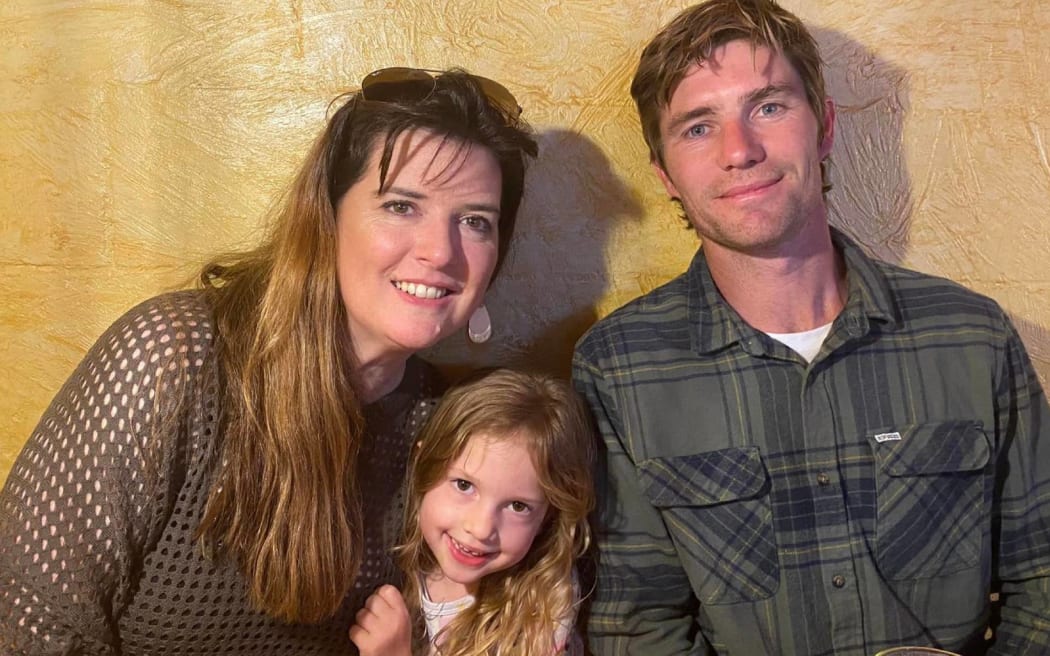
Vickie Hudson-Craig with her husband Ryan and daughter Ruby. Photo: Supplied
Instead of spending time with her six-year-old daughter, terminal cancer patient Vickie Hudson-Craig is fighting Pharmac for drug funding to prolong her life.
She has drained her KiwiSaver account, spending $5000 a month on medication that slows the growth of four tumours on her heart, and feels panicked about paying for her next prescription.
Hudson-Craig was one of a number of patients and clinicians calling for Pharmac chief executive Sarah Fitt to resign at the agency's board meeting this week.
She does not believe Fitt puts people first.
The 43-year-old was taken into hospital in October 2020 with appendicitis. But a radiographer happened to catch a tumour in a scan, and she came home with a diagnosis of stage four melanoma.
When immunotherapy failed to work and a heart transplant was ruled out, her only option left was unfunded drugs dabrafenib and trametinib.
"It is a terminal diagnosis, it's just about how much time we can eke out with drugs," Hudson-Craig said.
Pharmac did not fund the drug publicly, and a personal funding application was declined, she said.
"You wake up in the morning and you're worrying about money. You go to sleep at night worrying about money. And yet all of that energy should be going on fighting the cancer for as long as you can, rather than just continually panicking about where the next prescription is going to come from.
"My time should be spent with my daughter, Ruby, not fighting for these drugs to be funded."
Despite her and her husband working fulltime, funds had run dry, so she had to endure periods without the drug and resort to crowdfunding.
"It's not as effective taking the drugs every two months, but it is holding the cancer stable. I'd like to be on it as much as I can be to try to get the maximum benefit, but there's no way we can do that," she said.
It was made even more difficult knowing that others on the drug fulltime had seen their cancer almost eliminated, she said.
"Even though it's very rare for [melanoma] to be in the heart, [Pharmac] considers it to be no different to any other organ… it was gutting, frightening. I felt powerless."

Sarah Fitt. Photo: RNZ / LUKE MCPAKE
Fitt came under fire this month for making "unprofessional" comments about journalist Rachel Smalley in emails with other senior Pharmac staff.
"Sigh..." was how Fitt titled an internal email last year that contained one of Smalley's editorials about how cancer patients, like Hudson-Craig, were having to crowdsource their essential drugs.
Fitt also reportedly laughed when admitting she did not always inform the health minister of how much it would cost to clear the medicine waitlist.
Seeing the comments from Fitt and other senior Pharmac staff made Hudson-Craig's blood boil.
"Very angry, very upset. [It was] almost a sense of hopelessness - you think that things might change or that it can't actually be as bad as you think, and then things like that come out and you realise it's actually worse.
"I wonder if they would behave differently if their families were on the receiving end of unfunded treatments and they understood the hardship and pain."
She made a Privacy Act request to Pharmac to see how the decision not to fund her life-saving medication was made.
"It was literally two emails that had just gone between two people, saying, 'Do you think this person qualifies? No,' and that was pretty much it.
"What came out clearly from those comments was that culture is from the top down. It needs a complete overhaul."
One of her main concerns was transparency - she was not even sure if a clinician had been involved in determining whether she was eligible for funding.
"The media can't question them, the public can't question them, the government says it's an impartial body that can't be questioned - who can question Pharmac?
"It's just not acceptable and [Pharmac] needs to be called into question. It's our [taxpayer] money at the end of the day."
Improving funding and reducing the time it took to approve drugs could also help with staffing shortages in the health system, Hudson-Craig believed.
"We've got a situation in this country where we're quite short on oncologists, and you can understand why.
"They're literally cut at the knees, they're saying to patients like me, 'We can save your life with this drug but we can't because we can't give it to you. Or if we do, you have to mortgage your house, beg your friends, cash in your pension [to fund it yourself].'"
Ruth Spearing, a haematologist with 30 years' experience, had no doubt Fitt needed to go.
"The fact that she could laugh openly that she had any role, any duty to alert the government to how poorly Pharmac had been performing because of the funding levels indicates that she's not fit for the job."
Pharmac's performance began to drop around the time Fitt moved into senior management roles, Spearing believed.
"She became director of operations in 2013, chief executive in 2018 and during that 10-year period, unfortunately, we really have seen Pharmac become far less efficient and effective.
"For example, back in 2013, the time taken for a drug to be funded was very, very similar to Australia - around 400 days. However, by 2020, that had extended out to almost three years."
Meanwhile, according to Medicines New Zealand data, Australia's time period was still less than 18 months.
Pharmac needed to come into line with what other countries with a similar gross domestic product (GDP) were funding, Spearing said.
"One of the most important things that needs to happen is that the chief executive of Pharmac needs to take the responsibility, and the board need to take responsibility, of ensuring the government truly understands how far behind other OECD countries we are.
"They must accept that that is their role as chief executive and board chairperson."
Pharmac's response
Pharmac said its board chair "had met face to face with the senior leadership team on 9 October and instructed them to identify actions that can be taken to prevent a situation like this from happening again".
Those actions were expected to be presented at the full board meeting today, to see "if they suitably address the matter".
Pharmac would not provide RNZ with a copy of the meeting agenda, instead making the request into an Official Information Act application.
Te Whatu Ora's board was also meeting this week, and its agenda had been made publicly available beforehand.




